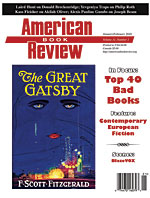 |
| The cure for boredom is curiosity. There's no cure for curiosity. |
Sunday, March 28, 2010
Friday, March 26, 2010
More on newsspeak
More on the fascinating topic of newscaster speech and mannerisms; Randy Michaels, CEO of the Tribune Company, has issued a list of words/expressions he finds obejctionable, and has forbidden his reporters and anchors to use. And here Ian Chillag at NPR uses them all in one sentence
Tuesday, March 23, 2010
Monday, March 22, 2010
Friday, March 19, 2010
I don't want some punters opinion, usually. No!
Some of you will recall that I wondered in August 2008 where the dramaturgy for some of the most annoying mannerisms of our age comes from, e.g. the idiotic antics of breakfast show hosts and hostesses? Charlie Brooker doesn't provide an answer, but here's his hilarious take on another kind of standardized idiocy, 'the "news report" visual language, immediately recognizable to anyone.' Notice for example that tilt of the head after he finishes his introduction - brilliant!
MAPLight.org
(from BeSpacific)
"MAPLight.org, the award-winning nonpartisan, nonprofit research organization dedicated to illuminating the connection between money and politics, has launched a new web site which shines the light of transparency and accountability in powerful ways as never before. The new site is being launched during Sunshine Week, a nonpartisan, national initiative to open a dialogue about the importance of open government and freedom of information. MAPLight.org users will find on the new site robust tools to
"MAPLight.org, the award-winning nonpartisan, nonprofit research organization dedicated to illuminating the connection between money and politics, has launched a new web site which shines the light of transparency and accountability in powerful ways as never before. The new site is being launched during Sunshine Week, a nonpartisan, national initiative to open a dialogue about the importance of open government and freedom of information. MAPLight.org users will find on the new site robust tools to
- illuminate how money aligns with votes
- reveal data on individual legislators and how much money they have received from industry and organizations
- expose specific contributions to persons, by parties, by committee, and within date ranges and important and vital features including
- a new U.S. Congress research blog
- a powerful search engine"
Dictator chic
From Vanity Fair:
Since completing his transition from international pariah to statesman, Colonel Muammar Qaddafi—the longest-serving leader in both Africa and the Arab world—has brought color and his own eccentric panache to the drab circuit of international summits and conferences. Drawing upon the influences of Lacroix, Liberace, Phil Spector (for hair), Snoopy, and Idi Amin, Libya’s leader—now in his 60s—is simply the most unabashed dresser on the world stage. We pay homage to a sartorial genius of our time.
Wow - looking at these pictures makes me wonder what a good looking guy like Obama could do with a little fashion savvy!
Since completing his transition from international pariah to statesman, Colonel Muammar Qaddafi—the longest-serving leader in both Africa and the Arab world—has brought color and his own eccentric panache to the drab circuit of international summits and conferences. Drawing upon the influences of Lacroix, Liberace, Phil Spector (for hair), Snoopy, and Idi Amin, Libya’s leader—now in his 60s—is simply the most unabashed dresser on the world stage. We pay homage to a sartorial genius of our time.
Wow - looking at these pictures makes me wonder what a good looking guy like Obama could do with a little fashion savvy!
Thursday, March 18, 2010
Sometimes...even in these times... a great notion!

*Ill fares the land, to hast'ning ill a prey,
Where wealth accumulates, and men decay;
Princes and Lords may flourish, or may fade:
A breath can make them, as a breath has made;
but a bold peasantry, their country's pride,
When once destroyed can never be supplied. Oliver Goldsmith
Thursday, March 11, 2010
Battle of Britain over a future library
Coffee shops, gigs, free cinema tickets, flashy architecture . . . is this the future of our libraries?
Stuart Jeffries writes in the Guardian about the proposed Birmingham library, government plans to shake things up, and the people standing in their way. UK culture minister Margaret Hodge opines on libraries ("I do care passionately about libraries," she says, "but they have to change") and librarians, who should be replaced by volunteers.. "There's nothing that depresses me more," Hodge says, "than going into a library and being confronted by a computer and someone in authority who isn't going to deliver the citizen-focused services I think should be on offer. I won't have this. Libraries can't go on being merely traditional. That's why we should consider volunteers." Judging from the artist's conception, security will be tight; looks like Christo has been brought in to envelop the entire structure in gigantic chain-link fencing.
Stuart Jeffries writes in the Guardian about the proposed Birmingham library, government plans to shake things up, and the people standing in their way. UK culture minister Margaret Hodge opines on libraries ("I do care passionately about libraries," she says, "but they have to change") and librarians, who should be replaced by volunteers.. "There's nothing that depresses me more," Hodge says, "than going into a library and being confronted by a computer and someone in authority who isn't going to deliver the citizen-focused services I think should be on offer. I won't have this. Libraries can't go on being merely traditional. That's why we should consider volunteers." Judging from the artist's conception, security will be tight; looks like Christo has been brought in to envelop the entire structure in gigantic chain-link fencing.
Wednesday, March 10, 2010
CMO's guide to social media landscape
From www.cmo.com, a CMOs guide to the social media landscape....
 |
| http://www.cmo.com/social-media/cmos-guide-social-media-landscape |
Bad Reviews III
(I've discussed snark and bad reviews - and my mixed feelings of delight and shame - previously, hence the title of this post)
In the current issue of American Book Review , 40 reviewers - all with academic affiliations (is that required?!) - get to say a few words about their least favorite books. From the editors' introduction: "Calling the question of 'bad books' to the fore elicited - as might be expected - an overwhelming response." (So, it's not just me). Not surprisingly, the 40 selected entries include some surprises; Revolutionary Road, Women in Love, All the Pretty Horses, An American Tragedy, and The Great Gatsby are there, but also some very credible suggestions like "Dildo Cay" (1940), about which the reviewer writes "For starters, one questions the presumption that even the most sober war-era reader would leap to associate the titular islet with the tall Caribbean cactuses that populate it, rather than, say, with artificial phalluses..." Anyway, 40 short and enjoyable reviews!

In the current issue of American Book Review , 40 reviewers - all with academic affiliations (is that required?!) - get to say a few words about their least favorite books. From the editors' introduction: "Calling the question of 'bad books' to the fore elicited - as might be expected - an overwhelming response." (So, it's not just me). Not surprisingly, the 40 selected entries include some surprises; Revolutionary Road, Women in Love, All the Pretty Horses, An American Tragedy, and The Great Gatsby are there, but also some very credible suggestions like "Dildo Cay" (1940), about which the reviewer writes "For starters, one questions the presumption that even the most sober war-era reader would leap to associate the titular islet with the tall Caribbean cactuses that populate it, rather than, say, with artificial phalluses..." Anyway, 40 short and enjoyable reviews!

Bestsellers database
University of Illinois professor John Unsworth's 2006 graduate seminar on “Twentieth-Century American Bestsellers”generated a browsable database of bestsellers - a truly useful and fascinating class project. Unsworth was apparently training his students to think about books from every conceivable angle; each of the 337 entries includes an amazing wealth of detail about the book's author, history, appearance, reception, sales, translation, serialization, pagination, etc.
Tuesday, March 9, 2010
The stark terror of stark text....
The Onion is on to something here...
Excerpt:
"Why won't it just tell me what it's about?" said Boston resident Charlyne Thomson, who was bombarded with the overwhelming mass of black text late Monday afternoon. "There are no bullet points, no highlighted parts. I've looked everywhere—there's nothing here but words."
Excerpt:
"Why won't it just tell me what it's about?" said Boston resident Charlyne Thomson, who was bombarded with the overwhelming mass of black text late Monday afternoon. "There are no bullet points, no highlighted parts. I've looked everywhere—there's nothing here but words."
 |
| The giant mass of prose was devoid of so much as a large pulled quote for readers to glance at before moving on. |
Friday, March 5, 2010
Norway wins most medals in Vancouver
I don't often have occasion to quote World Affairs Journal , but this time they certainly get something right: Norway is the runaway winner in the Olympic Medals Per Capita Rankings followed by Austria, Slovenia, Sweden, Switzerland, and Finland.
"Books just leave too much to the imagination!"
As noted in a post last year about vooks, it's hard to imagine how tired old text will stand its ground against the audio, video and web-enabled stuff that assail our senses from the screen of the latest hand-held device. Here's a look of at some of things Penguin has in the works for the new iPad. And once again, to say that audio and video "enhances" the reading experience, that's an understatement on the order of saying that motion picture enhanced the reading of silent movie captions.
Thursday, March 4, 2010
Michael Stephens on
Michael Stephens on Trends & Technologies for 2010
Trends Tech 2010 for Librarians
View more presentations from Michael Stephens.
How not to use Twitter
I'm ashamed to admit it, but chipmunk voice always makes me laugh.....from Charles Trippy
Subscribe to:
Posts (Atom)






